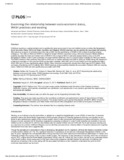Browsing James P. Grant School of Public Health (JPGSPH) by Subject "Water quality"
Now showing items 1-2 of 2
-
Cluster-randomised controlled trials of individual and combined water, sanitation, hygiene and nutritional interventions in rural Bangladesh and Kenya: the WASH benefits study design and rationale
(© 2013 BMJ Open, 2013)Introduction: Enteric infections are common during the first years of life in low-income countries and contribute to growth faltering with long-term impairment of health and development. Water quality, sanitation, handwashing ... -
Examining the relationship between socioeconomic status, WASH practices and wasting
(© 2017 Public Library of Science, 2017-03)Childhood wasting is a global problem and is significantly more pronounced in low and middle income countries like Bangladesh. Socio Economic Status (SES) and Water, Sanitation and Hygiene (WASH) practices may be significantly ...

